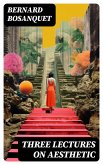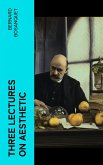In "Three Lectures on Aesthetic," Bernard Bosanquet presents a profound exploration of the nature of beauty and art within the context of late 19th-century aesthetics. Through a blend of philosophical inquiry and art criticism, Bosanquet critically engages with the ideas of contemporaries while advocating for an organic unity in the experience of art. His literary style is characterized by dense, yet eloquent prose that invites readers to contemplate the complexities of aesthetic experience, highlighting the interplay between observer and artwork. The lectures serve as a synthesis of philosophical aesthetics, offering insights into the role of the artist, the function of art within society, and the importance of emotional and intellectual engagement in the appreciation of beauty. Bosanquet, an influential British philosopher, was deeply involved in the intellectual milieu of his time, which included the burgeoning fields of sociology, psychology, and aesthetic theory. Drawing from Hegelian philosophy, his lectures reflect a larger discourse on the nature of art as a social construct, influenced by his own experiences in the visual arts and his commitment to fostering a deeper understanding of human experience through culture and creativity. I highly recommend "Three Lectures on Aesthetic" to those interested in the philosophical underpinnings of art and beauty. Bosanquet's thoughtful examination invites readers to reconsider their perceptions of aesthetics, making this work an essential read for scholars, artists, and anyone seeking a deeper engagement with the transformative power of art.
Dieser Download kann aus rechtlichen Gründen nur mit Rechnungsadresse in A, B, BG, CY, CZ, D, DK, EW, E, FIN, F, GR, H, IRL, I, LT, L, LR, M, NL, PL, P, R, S, SLO, SK ausgeliefert werden.









